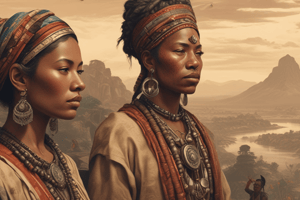Podcast
Questions and Answers
Alin sa mga sumusunod ang pinakamahalagang epekto ng kolonyalismo sa mga kulturang katutubong Asyano?
Alin sa mga sumusunod ang pinakamahalagang epekto ng kolonyalismo sa mga kulturang katutubong Asyano?
- Pagkalugi ng mga tradisyunal na gawain at sining
- Pagkalugi ng mga katutubong wika at kulturang nakalipas
- Pagtatalaga ng mga bayang Asyano sa mga kolonyal na puwersa
- Pag-angkin ng wikang Ingles bilang pangunahing wika ng edukasyon at pamahalaan (correct)
Ano ang naging positibong epekto ng kolonyalismo sa mga Asyano?
Ano ang naging positibong epekto ng kolonyalismo sa mga Asyano?
- Napalawak ang kanilang pang-unawa sa kanilang nakaraan at koneksyon sa lupa at mga yaman
- Napalawak nito ang kanilang pang-unawa sa kanilang pagkakakilanlan at pakiramdam ng pagkakabahagi (correct)
- Pinasimulan nito ang mga kilusan para sa kalayaan at dekolonyalisasyon
- Nakatulong itong hikayatin ang pagkakaisa at pagpapahalaga sa kulturang katutubong Asyano
Ano ang naging negatibong epekto ng kolonyalismo sa mga Asyano?
Ano ang naging negatibong epekto ng kolonyalismo sa mga Asyano?
- Nawala ang kanilang mga katutubong wika at kultura
- Nawala ang kanilang koneksyon sa lupa at mga yaman (correct)
- Nawala ang kanilang pag-unawa sa kanilang nakaraan at mga makasaysayang narratiba
- Nawala ang kanilang pakiramdam ng pagkakabahagi at pagkakakilanlan
Ano ang naging epekto ng mga kilusan para sa kalayaan at dekolonyalisasyon sa mga lipunang Asyano?
Ano ang naging epekto ng mga kilusan para sa kalayaan at dekolonyalisasyon sa mga lipunang Asyano?
Bakit mahalaga na mapanatili ang pagkakakilanlan ng kultura sa panahon ng mga banta?
Bakit mahalaga na mapanatili ang pagkakakilanlan ng kultura sa panahon ng mga banta?
Ano ang ibig sabihin ng "cultural assimilation"?
Ano ang ibig sabihin ng "cultural assimilation"?
Ano ang isa sa mga epekto ng paglaban laban sa "cultural assimilation"?
Ano ang isa sa mga epekto ng paglaban laban sa "cultural assimilation"?
Ano ang ginawa ng mga Siamese (Thai) na nagpakita ng paglaban laban sa "cultural assimilation"?
Ano ang ginawa ng mga Siamese (Thai) na nagpakita ng paglaban laban sa "cultural assimilation"?
Ano ang papel ng mga karismatikoag lider sa paglaban laban sa "cultural assimilation"?
Ano ang papel ng mga karismatikoag lider sa paglaban laban sa "cultural assimilation"?
Ano ang isa sa mga paraan upang malabanan ang "cultural assimilation"?
Ano ang isa sa mga paraan upang malabanan ang "cultural assimilation"?
Flashcards are hidden until you start studying
Study Notes
Colonization and Imperialism in South and Southeast Asia: Cultural Assimilation
Cultural assimilation refers to the integration of one culture into another, often as a result of colonization and imperialism. This process involves the adoption of customs, traditions, beliefs, and practices from the dominant culture by individuals or groups from the minority culture. In the context of South and Southeast Asia, cultural assimilation resulted from the interaction between European colonial powers and the local population. This article will explore the effects of cultural assimilation on the regions of South and Southeast Asia, focusing on the subtopics of resisting assimilation and understanding the legacies of colonization and imperialism.
The Impact of Resistance against Cultural Assimilation
While some actors in South and Southeast Asia embraced the changes brought about by European colonial powers, others actively resisted cultural assimilation. One such resistance movement was embodied by the Siamese (Thai) rulers, who implemented a significant nation-building effort to prevent colonization. Measures included modernizing the political system and promoting geographic knowledge to protect the country's borders and interests.
However, resistance was not limited to official channels. Throughout the region, local rebellions were often led by charismatic leaders who drew upon traditional values and philosophies to rally support against foreign influence. These movements demonstrate the persistence of indigenous cultures in the face of external threats and the importance of maintaining cultural identity in times of adversity.
Understanding the Legacies of Colonization and Imperialism
Cultural assimilation has left a lasting impact on the societies of South and Southeast Asia. For example, in Singapore, English was adopted as the required language for government and educational instruction during British rule, effectively displacing indigenous languages. This legacy has influenced the ability of younger generations of Asian Americans to communicate with older generations and has shaped their understanding of cultural and historical narratives.
In the diaspora, the memory of colonialism and its influence on identity have been both positive and negative. On one hand, the colonial rule has shaped the way people view their past, their connection to land and resources, and their sense of belonging. On the other hand, the process of decolonization and independence movements have led to societal change and a reevaluation of historical narratives.
Reach for References
- Britannica: History of Southeast Asia - Colonial Patterns, Trade, Culture
- Wikipedia: European colonisation of Southeast Asia
- Colonialism in Southeast Asia: Resistance, Negotiation and Legacies
- NBC News: Across generations, South and Southeast Asians reflect on the impact of colonialism on identity
- Oxford Academic: Colonies | Southeast Asia: A Very Short Introduction
Studying That Suits You
Use AI to generate personalized quizzes and flashcards to suit your learning preferences.




